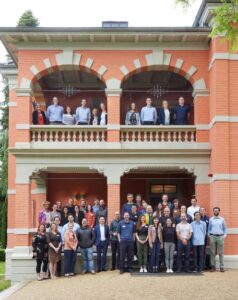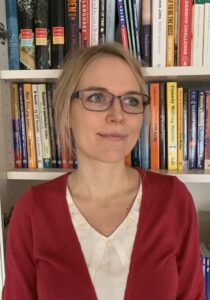Written by Professor Natalia Kucirkova
Fellowships Provide Access to Radical interdisciplinarity That Is Increasingly Rewarded by International Funding Bodies

At the joint annual meeting of CIFAR Azrieli Global Scholars and Jacobs Foundation Fellows in June 2022, I sat next to an evolutionary biologist discussing cybernetics, a social scientist advocating for equity in Global South and a professor in gravity and extreme universe. We laughed, we shared our passion for research, and we came up with a focused interdisciplinary project that we pitched to the Foundations’ seed funding the following day. This is the most rewarding part of a Research Fellowship –access to an interdisciplinary network of high-calibre, passionate scholars, whose joint expertise generates innovative research perspectives.
Interdisciplinarity, cross-disciplinarity, multi-disciplinarity or even trans-disciplinarity, are not a new trend in research. Indeed, the most prestigious research grants have always been about researchers’ ability to cross disciplinary boundaries and establish synergies across fields. ERC Synergy grants explicitly encourage proposals led by two to four principal investigators to tackle ambitious complex projects.
And yet, there are several structural and attitudinal barriers for interdisciplinary research. Researchers are trained in their neatly defined disciplines, placed in departments with established traditions and encouraged to publish in journals dedicated to their disciplinary focus. I am not suggesting that Fellowships, with their elite selection process, can dismantle the barriers between disciplinary languages or provide a solution for multi-connected problems. But given that traditional research training lacks opportunities for developing an interdisciplinary agenda, Fellowships can address an important gap.
In addition to a ready-made supportive network of global peers, there are many other benefits. Regardless of career stage, researchers who get a CIFAR, Radcliffe, Spencer, Jacobs or Fulbright Fellowship, can bolster their academic credentials. Fellows will get exposed to new research concepts or approaches that they would normally not have encountered.
And it is not just the CV part. The informal mentoring and peer coaching that happens through Fellows’ meetings are invaluable. At our last Fellows meeting, we discussed all kinds of challenges, from counteracting ageism at our institutions, to providing mental health support to our students impacted by Covid-19 or ways for protecting writing time.
A Fellowship can be as big as you make it, and you can be strategic about how you participate in meetings and joint activities. In the groups I am part of, we discuss conference plans while one member is cooking dinner and the other walking the dog. The personal/professional boundary crossing is much easier with online possibilities and like-minded, equally busy researchers.
Sure, getting a fellowship is not easy. The programs are highly selective because you compete globally and with top researchers in your field. I needed to fail several times and am still learning the tricks of the trade. In the process I have learnt that a Fellowship application is more personal than a standard research proposal, and that it is more impact-oriented with a strong emphasis on collaboration. So that the proposal stands out from the crowd, the researchers need to explain, in plain language, how their project advances the field and how it fits with the Foundation’s goals. The researchers thus need to have on their blue-sky-thinking-hat, and describe the innovative and creative impact the project will have now, and in the next ten years.
Fellowships are merit-based and strong recommendation letters are a must, so applying kept me in close contact with my previous collaborators, supervisors and project leaders. The most stressful part for me are one-to-one interviews at the shortlisting stage, but with preparation and advice provided from past Fellows or Fellowship-dedicated platforms (e.g., ProFellow), this too can become manageable.
I spent considerable time on developing my Fellowship applications, which, in pure economic terms, one might consider disproportionate to the amount of funding one receives (many Fellowships come with a stipend but in many cases, this is fairly low, and some Fellowships are unpaid). However, the application experience was invaluable when writing million-dollar grant proposals later on. The proposal writing process consolidated my thoughts on the key research prongs in my work, identified the red thread running through my studies, and opened up ideas for new areas. So, if you are hesitating whether you should spend time on developing a Fellowship application, my answer is an enthusiastic ‘yes’.

Natalia Kucirkova is Professor in Early Childhood and Development and Fellow of the Jacobs Foundation, Global Young Academy and Academy for Young Researchers in Norway.